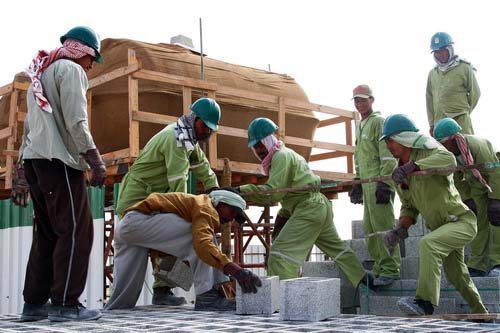
The international spotlight on Qatar over its mistreatment of low-income expats here is growing brighter and hotter, with new reports of abuses coming out almost daily.
The attention, due largely to the fact that Qatar is hosting the World Cup in 2022, is causing much consternation among some locals who are chafing at the criticism – but maybe that’s a good thing, some argue.
As far back as 2010, before Qatar got the bid, I Love Qatar’s Khalifa Saleh Al Haroon said the international focus prompted by the games could motivate the country to make improvements. In a blog post, he argued:
With people paying attention, things have to change (or most likely will). Remember that road in West Bay in front of City Center that was under construction for 6 months and was finished in a week before the UN came over for a meet up?
Perhaps this is the kick that Qatar needs to improve quality and get things done faster.
Other locals agree that change is needed. In response to criticism of a recent Guardian report detailing labor abuses among Nepali expats, one Qatari said:
@Halawala there is flaw that must be fixed, laws that must be enforced. Whining that everyone hates us, won’t take us anywhere
— AbdulRahman Al Baker (@Aalbaker)
So what can be done in the next nine years to address these labor violations?
Two things, according to Pete Pattison, author of the Guardian report. Speaking to Doha News, he said:
“It’s not like this is an insurmountable problem. The labor law needs to be enforced, and the sponsorship law needs to be radically reformed or abolished completely.”
In an op-ed published this weekend, Nicholas McGeehan of Human Rights Watch echoed that view, but also mentioned that denial is hindering efforts to improve the situation on the ground.
“The ministry of labour told Human Rights Watch in 2012 that it was ‘inconceivable’ that forced labour existed in Qatar, despite compelling evidence to the contrary.”
Meanwhile, many in the local community have no desire to change the kafala system, and some hope to see it strengthened, according to a Qatar University study.
But as pressure for reform from inside and outside of the country grows, the only way forward for Qatar is to end forced labor, McGeehan said. And to do that, a mandate must come from the top, he added:
“Sheikh Tamim, Qatar’s new emir, has much to gain from taking a strong line on labour rights and empowering Qatar’s reformers to take the steps required to end forced labour in the country. You don’t need a crystal ball to figure out what will happen if he doesn’t.”
Meanwhile, Pattison, who spent three months working on his report (of which he spent one week interviewing workers in Qatar), added that more also needs to be done by the governments who are exporting their people to work in the Gulf.
“It’s not all about the Qatari government – this problem is a combination of the failing on both sides, at the destination end and the country of origin.”
The main thing countries like Nepal can do is monitor and regulate the recruitment agencies far more rigorously, so that nationals are not tricked into taking on loans to work in jobs that pay far less than was initially promised, he said.
Until improvements are made on both ends, the cost right now for poor expats to pursue jobs in Qatar is just too high, added the journalist and teacher, who is based in Kathmandu.
There, Pattison said said three or four bodies of Nepali men and women are flown back to the airport daily, after dying in countries like Qatar, Saudi Arabia and Malaysia.
“It’s when you go the airport and see the families who are collecting their loved ones – you see what those numbers and those statistics mean,” he said.
Thoughts?
Credit: Photo by Richard Messenger







